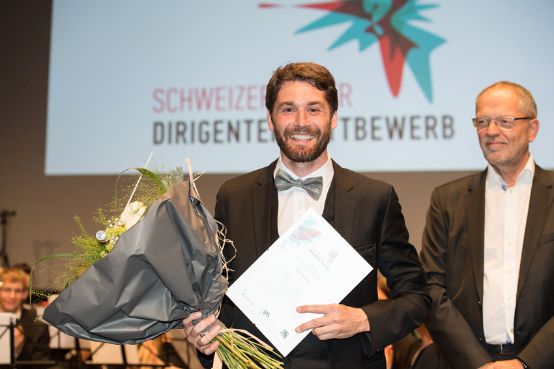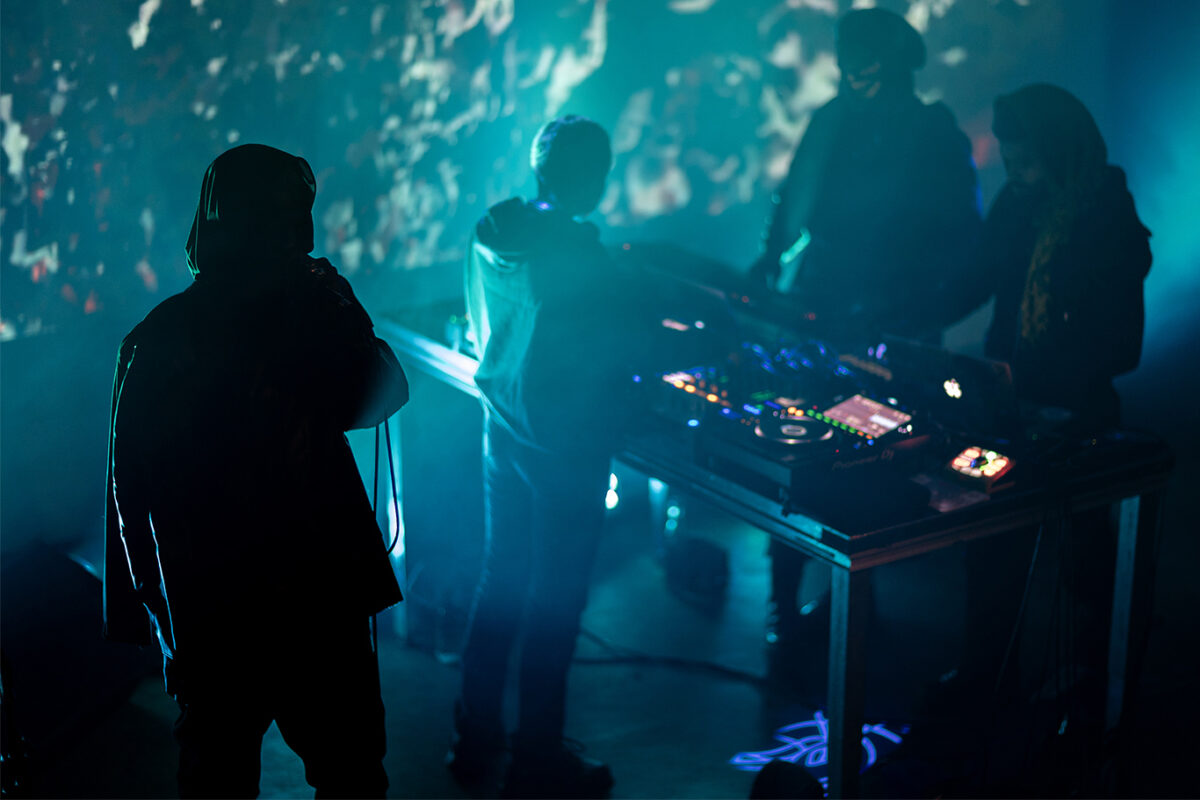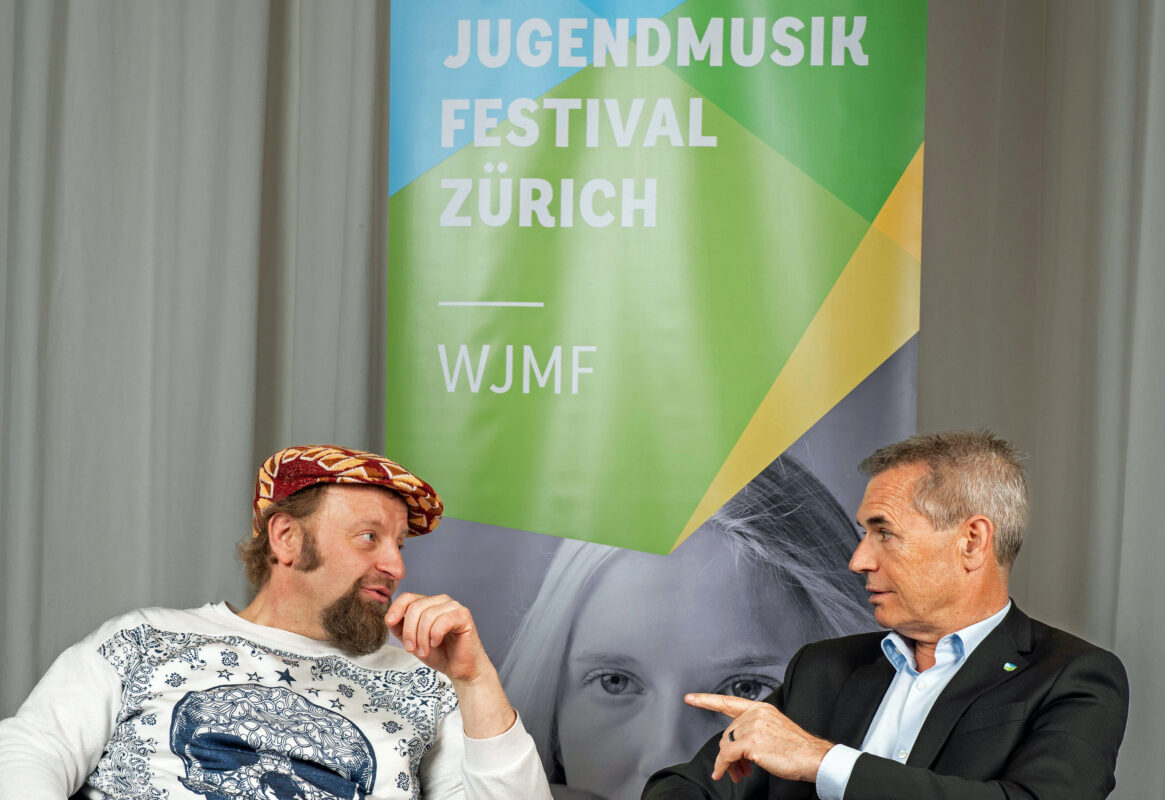Winner to Los Angeles
28-year-old Théo Schmitt from Vaud is the best young conductor in Switzerland. He won the Swiss Conducting Competition in Baden thanks to a combination of natural charisma and perfect rehearsal work.

What is a good conductor? Dancer, teacher, therapist, whipper-in, rapper or diva? The drug of making music together is addictive, said the organizers at the final of the 9th Swiss Conducting Competition. The chance of getting into the flow is much greater if the conductor is enthusiastic, charismatic and takes everyone into his world. This promotion of talent is the task of the tried-and-tested event, which took place this week in Baden.
All decisions of the three-member jury were unanimous: The winner of the ninth Swiss Conducting Competition (September 4 to 9, 2019) is Théo Schmitt from Palézieux. The 28-year-old from Vaud impressed the jury with his interpretation of the top-class work "Praise Jerusalem" by Alfred Reed. Raphael Honegger from Aargau came second and Laurent Zufferey from Valais came third.
"A convincing conductor"
The prizes are only awarded if the high standards set by the jury (Jan de Haan, Philippe Bach and Carlo Balmelli) are met. This was the case this time, as the overall standard of the 23 participants was exceptionally high. The jury chose Schmitt because he was clearly the best over the whole week, as jury president Jan de Haan explained. The Vaud native rehearsed very well and had an excellent grasp of the score. Despite the pressure of the competition, he performed confidently and convincingly. Thanks to his good charisma and good contact with the orchestras, Schmitt is a convincing winner according to jury president Jan de Haan.
Winner Théo Schmitt struggled to grasp what the victory meant for his career immediately after the announcement. As he will be starting a two-year course in film music in Los Angeles next week, there is a lot going on at the moment anyway. This may have taken the pressure off him. Instead, he was able to enjoy rehearsals and concerts more and more each day. The only thing the Frenchman had worried about beforehand was the language barrier. In the end, however, his lack of German was more of an advantage, as he was able to approach the orchestra in a very personable way and express himself with the means of a conductor rather than with lots of words.
The "wrong" work
The same effect then applied to the final: Schmitt was awarded Praise Jerusalem was given the exact piece that he absolutely did not want. He then worked through the whole night between the semi-final and final and in the morning was ultimately very convinced by this composition. That's why Théo Schmitt says: "Winning is not the most important thing in the conducting competition." The focus is on the learning process for and during the event - with this in mind, he is now also looking forward to the upcoming detailed critique by the jury.
The conducting competition enjoys an excellent reputation in the wind music scene. It is a unique platform to compete, face a jury and make music with great orchestras. Former winners are still successful conductors today and enjoy an excellent reputation. This type of promotion of young talent is also extremely interesting for the public. It is rare to be able to compare so directly how conductors behave, what gestures and looks they use to direct the orchestra, whether they manage to create tension, whether their handling of the conductor's baton is appropriate to the work and whether the candidate gives the musicians space to make music.
Demanding elimination
23 candidates had originally registered for the 9th Swiss Conducting Competition and had to master a challenging program in a total of four rounds. The twelve people admitted to the Swiss Conducting Competition by the Music Commission had been rehearsing a piece unknown to the orchestra for half an hour with the Baden Wettingen Wind Orchestra since the middle of the week in the preliminary round. In the semi-final on Friday, the candidates were given five minutes to rehearse a composition already known to the Brass Band Emmental or to play strategic passages. The work was then performed. In the final, the three finalists each spent 45 minutes rehearsing a composition known to the Bern Symphony Brass Orchestra (Sibo), which was then performed at the gala concert.
The competition is also a challenge for the orchestras because the candidates interpret the individual passages differently. There are various strategies for preparing a work. For the conductors, the question arises - in addition to the high technical challenges - of how to gain the orchestra's attention. A brief nod for a cue, a smile after a successful solo or a joke before the start show whether a candidate is on top of things.
The ninth edition of the conducting competition was a complete success. For the first time (with the exception of the candidate selection), all competition rounds were open to the public. Everything went smoothly, as the jury, audience and candidates unanimously confirmed. We can only hope that the financial situation of the Swiss Conducting Competition Association will allow it to organize such a platform for young conductors again in three years' time.
Ranking list
1st prize: Théo Schmitt, Palézieux (VD)
2nd prize: Raphael Honegger, Birr (AG)
3rd prize: Laurent Zufferey, Sion (VS).The semi-finals were contested by these three candidates and Gaudens Bieri (Trimmis, GR), Emilie Chabrol (Basel, BS) and Mathieu Charrière (Saint Gervais, F).
Théo Schmitt
Théo Schmitt is 28 years old and comes from Palézieux. He studied orchestral conducting at the Conservatoire and the Lausanne School of Music. He has conducted the Orchestre Quipasseparlà since 2018. He has conducted the orchestras L'Harmonie d'Oron, the Young Guard of the Landwehr de Fribourg and L'Avenir d'Aclens and has taken part in numerous festivals, particularly for young musicians. As a conductor, he wants to inspire the musicians of the orchestra with his passion and gives them everything he has in the moments of playing together. Théo Schmitt has also been composing in various styles since 2012. In the coming week, his musical path will therefore take him out of Switzerland. He will be studying film music composition in Los Angeles. Schmitt conducted in the final of the conducting competition Praise Jerusalem by Alfred Reed.








